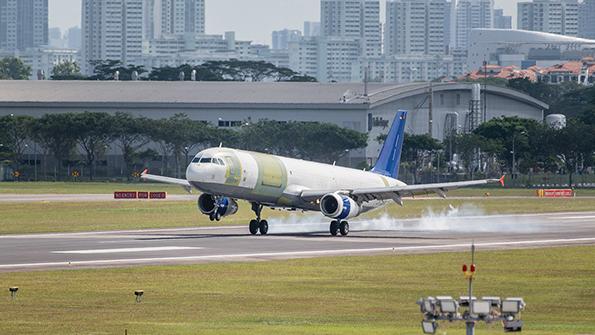
Airbus has been offering A321 passenger-to-freighter conversions. Now it is looking at new-build freighters based on the A321neo.
The location was carefully selected. An event attended by more senior-level people buying aircraft is hard to conceive.
That was the scene at the end of September in Marrakech, Morrocco, where lessors and the aircraft finance community at large gathered for the International Society of Transport Aircraft Trading (ISTAT) conference. And Airbus had something to say about freighters: They are not only on the radar but very much in focus.
- Airbus is moving closer to launching A330neo, A321neo freighter versions
- CEO Guillaume Faury points to strong demand
- Manufacturer is committed to gaining higher cargo market share
“We are looking at new-build A321neo and A330neo freighters,” Paul Meijers, Airbus senior vice president of sales and marketing, told attendees at the ISTAT Europe, Middle East and Africa conference on Sept. 19.
Airbus has not been competitive in the new-build freighter market for some time, leaving the segment essentially to Boeing and the 767F and 777F. Last year, Airbus launched the A350F and has had some considerable early sales success. “We want a much larger share of that market,” Meijers said. “We will address that market in a much stronger way.” He added that the A350F was “just the start.”
As it turned out, Meijers was laying the groundwork for his boss, Airbus CEO Guillaume Faury. A couple of weeks later, Faury told analysts at the company’s Capital Market Day—held for the first time since the start of the COVID-19 pandemic—that freighter versions of the A330neo and A321neo were in high demand. Therefore, developing cargo versions of the aircraft made a lot of sense.
Neither Faury nor Meijers indicated when Airbus may be ready to launch more new-build freighters. But unlike Boeing, the company is under no pressure to replace its current single-aisle passenger aircraft family anytime soon, so Airbus can afford to dedicate most of its research and development spending on the ZEROe hydrogen aircraft project slated for entry into service in 2035. There are only two major derivative programs Airbus is working on in the near term: the A321XLR and the A350F, which are due to arrive in 2024 and 2025, respectively.
Talk of A330neo and A321neo freighter versions is not new, and A321 classic passenger-to-freighter conversions are available as well. Airbus apparently has been discussing the A330neo cargo variant with express freight carriers such as UPS, whereas AirAsia has hinted at being interested in operating a potential cargo version of the A321neo on intra-Asia routes. The airline said last year that it would consider converting a part of its existing order for passenger aircraft to a cargo model.
With just 38 aircraft sold, the first-generation A330 freighter was not a commercial success. However, a cargo aircraft based on the A330neo would almost certainly offer better range and economics. Also, the cargo market has strengthened substantially, with e-commerce driving a lot of the growth, a segment for which an aircraft the size of the A330neo could work well.
Another factor in Airbus’ strategy is that Boeing cannot produce the 777F and 767F beyond 2027 because of International Civil Aviation Organization emissions regulations. While the 777-8F will succeed the 777F, Boeing does not yet have a successor for the 767F. Boeing President and CEO Dave Calhoun recently described a 787F as the most likely replacement option but indicated that Boeing will not launch such a program quickly.
Airbus officially started the A350F in 2021 and gave itself four years until first delivery in 2025. Depending on the extent of changes required, derivatives of the A321neo and A330neo could take a similar amount of time to develop. On the A321neo side, the situation is more complex because of the passenger version’s current ramp-up challenges—the aircraft is much more difficult to build than the A320neo. The A330neo is being produced at low rates of less than two aircraft per month. Airbus has delivered just 13 since the start of the year. A freighter version could help boost production rates.
But whether the air cargo boom will continue is another question. Geoff Kehr, senior vice president of global air fleet management at DHL, expressed “cautious optimism” about demand and told attendees at the ISTAT conference that he is “not concerned that things are falling apart.”
Guy See, Fedex’s managing director of aircraft acquisitions and sales, said the company is seeing “some impact” on business from factors like high inflation and interest rates or the Russia-Ukraine War. “Customers are not spending as much. The lower volumes are hopefully a short-term issue,” See said. Fedex said Sept. 15 that business conditions will “further weaken” in the fourth quarter.
For Airbus, the big question is whether air freight will continue to be a larger part of the business than it has historically been. Faury’s answer appears to be a clear “yes.”





